In one of the world’s poorest countries an innovative new sports foundation led by a premier league player is changing more than just perceptions.
***
“The rebels were at our door. They came in with their guns. They wanted my baby son. I pleaded no, that he had a stomach sickness. The female rebel told the men to go. She gave me 100,000 leones (£20) and left. I thanked God. Maybe if I didn’t have a sick son to care about they would also have taken me away. They killed one baby near to my house.”
It’s June 1997 and members of the Revolutionary United Front (RUF) are sweeping through the Kington district of Freetown, Sierra Leone ‘recruiting’ for their militia by snatching babies and children and shooting the rest.
The ‘resource’ war was being fueled by a fight for diamonds dug along river beds to the East of the capital. The exchange of diamonds for weapons between the RUF and Liberia was deepening the crisis. The 1997 surge on Freetown was its violent climax where more than 3000 lives were lost. You’ve probably seen or heard of the film ‘Blood Diamond’ starring Leonardo Dicaprio depicting these horrific events. Sadly for many living in Sierra Leone today, this was a reality, not hollywood.
“Since my baby and I survived that day I have always wanted the best for him. Sometimes I sacrifice my whole salary just to send him to school. John is everything I have. At first I resisted football as I thought it would take time from school but now I can see the future it can give him. He is a goalkeeper and if he makes the academy everything could change. He could lead our country.”
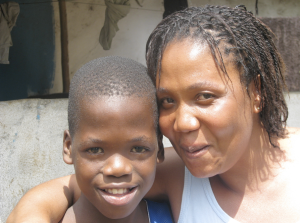
Selina MaCarthy, a nurse and her only son John Fillie, were lucky to survive. Twelve years on and John is on the cusp of being selected as one of a dozen first generation players to Sierra Leone’s first professional youth football academy. Scouted from across the country this small group of young boys will represent a project that has aspirations not just to help them realise their potential but to also use football to empower teams and communities to initiate positive social change. An ambitious project in any country, but considering the recent history of Sierra Leone and with unemployment at 80%, it appears brave and optimistic.
***
Freetown
“Welcome to Lungi International – you are in Freetown now!” Exclaims Kenya Airways as you taxi past the mirage of palm trees on a single strip of sweltering tarmac.
Freetown. Like its African neighbour to the North East, Timbuktu, Freetown is one of those distant, exotic, almost mythical places that most of us are aware exist, vaguelly recalling a lyric from a song or a reference in history, but little more. This is slightly worrying, considering the significant role we as a colonial power played in forming it. Aside from the familiarity of names – Aberdeen, Waterloo, Hastings – the first thing you notice in Freetown is the typical bustle but without the hassle I’ve experienced in other African cities. The dramatic geography of Freetown – sweeping peninsula, arcing beaches and ports, and steep surging hills, is almost at odds with its quiet charmed chaos; endless ramshackle Dickensian markets, with seas of people, taxis, bikes, trolleys, swelling in and out of the streets like tides. There are numerous war-inflicted amputees who wheel themselves along muddy alleyways in gloriously inventive homemade contraptions. One guy who looks my age and has lost both his legs high above the knee calls me from his tricycle, ‘hey aboto (white man) don’t take taxi. Come with me. I have four wheel drive,’ before pulling an impressive wheely, laughing loudly and spinning off down the hill.
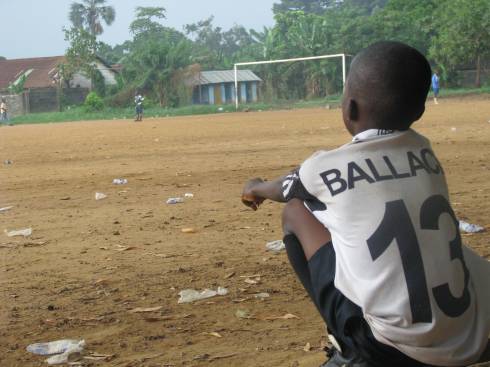
The buildings have retained their colonial style but since the war many have changed the materials they’re built with; window shutters and steep rooftops are bent out of corrugated iron rather than hard woods and stone – it’s like a Tim Burton town in the sunshine. If anything, wondering through Freetown I feel less threatened, less of an outsider, than in other African city’s I’ve visited. In Freetown you happily become part of that ‘seething mass of humanity’ we often hear about but rarely experience.
My invite to this vibrant place came via a friend I’d kept in touch with since the summers I’d spent leading volunteer expeditions in West Africa. In 1999 Tom Vernon took some time out from a sports science degree in Liverpool and found himself coaching and teaching on the streets of Ghana’s capital, Accra. Tom was quickly struck by the gaping hole between the potential of these brilliant ten year olds and the countries so called poor Premier League. Something was going badly wrong in their development. It didn’t take a rocket scientist to work out that a lack of adequate nourishment and basic education were undermining any chance these young talented players of becoming something. Tom rallied family and friends in High Wycombe and soon had the funds to start a basic academy. He scouted the country for his first generation of players, recruited volunteer coaches and teachers and set about work. Ten years on, Tom and his team at Right to Dream are completing a European standard sports academy in Ghana, have graduates at Fulham FC and, almost more impressively considering these boys backgrounds, 22 are currently on scholarships at top colleges in the UK and the States. Tom has also managed to become Manchester United’s head scout for Africa. Funny what a summer teaching English abroad can lead to.
In 2007 Tom got a call from a well known English Premier League player asking if he could help him set up a similar academy in Sierra Leone. Craig Bellamy, captain of Wales and today one of a plethora of world-class strikers at Manchester City, did not have the best ‘google me’ results page as he would be the first to admit. Regardless of reputations a partnership was formed, Bellamy visited Sierra Leone again, wrote a significant initial cheque and publicly made his commitment to the people of this war-torn nation. The government gave the newly formed Craig Bellamy Foundation a decent slice of land an hour from Freetown and in mid 2008 the goal-scorer took part in a ceremony and broke the earth where the new academy would be built.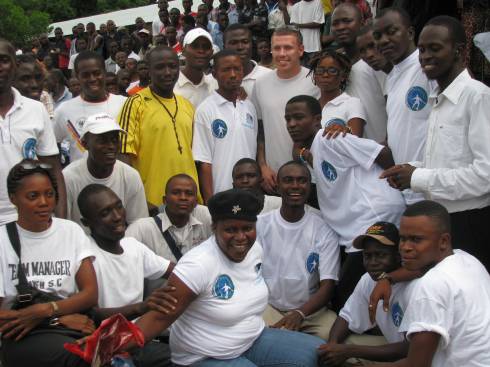
It’s July 2009 and Bellamy is in South Africa preparing for the upcoming season. His visit to Sierra Leone last month oversaw the final trials 27 of which, 16 will become the academy’s first generation. The young goalkeeper John and his mother are hoping he makes the cut.
Alongside the academy, the Bellamy Foundation has also set-up with seed funding from UNICEF, a football league built on incentives that go beyond winning fortnightly matches. Each one of the forty U14 and U12 teams are also awarded points for fair play on the pitch, attending school and on the weekends when games don’t take place, initiating and completing community projects. Meeting some of the teams coaches and managers and you soon discover that a football league table can be a powerful motivator.
As we watch the competitvely fought U12 game between Promising Stars and Portugeuse Town in front a crowd in their hundreds, Kamusu Koroma, Regional Manager for the league in the Freetown district tells me:
“Previously the coaches and supporters would beat the ref before the game starts. Through the coaches training programme and now in the league we are demostrating fair play and incentivising ourselves to change the way we behave.”
When I ask if this is an overnight change across the league, Kamusu acknowledges the reality, “This is not a day job, it is a process. The good thing is that we are confronting corruption head on and showing that you can win football matches without cheating and violence.”
Coach of Freetown’s Eastern Eagles, Abdul Karim, goes further; “I believe the fair play policy of the CBF league is already changing attitudes of the young players. We are moving away from violence in our communities because of this league.”
The boys themselves are understandably more focused on the football but are still aware of the bigger picture they’re involved in, “Let me say the difference between this league and other games I’ve played in is that we are all all brothers here. We don’t fight anymore but we can still win,” says a determined looking 13 year old called Suleman who is known simply to everyone else as Essien because he is rarely beaten in a challenge even when he plays with boys two years older than him.
Beyond the football pitches the teams have already been involved in community clean-ups, water well repairs, and leading peer and health education sessions. As Tom Vernon suggests this is quite something considering that many of these boys older brothers, uncles and fathers were the child soldiers that make “this today’s history.” And because like goalkeeper John, most of the boys in this league were born just as the civil war was reaching its peak in the late 1990s, it is not an exaggeration to say that it is with them where a good chunk of hope for a better Sierra Leone rests. We know there are many life lessons to be learnt through sport but when it is set against this kind of recent historical backdrop as it is here, it becomes a much more powerful opportunity to those fortunate enough to be involved. Coming here you can understand the wave of optimism.
During my stay in Freetown I am a guest of Durosimi Thomas and his family. Duro is the foundation’s in-country director who has built a career as a freelance BBC sports correspondent (he had a premonition in 2001 not to go to African Nations cup game in Ghana because he tripped on a stone that morning, 126 people died in a stadium crush that day), resurrecting local interest in football and staunchly fighting anti-corruption in his country at every turn. A deep voiced, our-man-in-freetown thick set man, Duro is only too aware not to get carried away;
“Football is what I know, and football can teach people to be better citizens quickly. But it will still take time. Bellamy has given Sierra Leonian’s a good opportunity to find a new way, let’s hope we take this chance.”
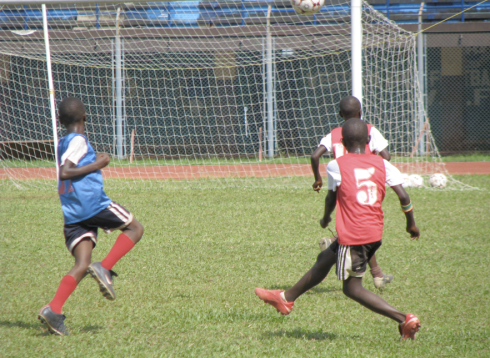 *****
*****
The league is only three months old and the academy is yet to open, but the hundred strong staff now involved with this new approach to sport and development in Sierra Leone obviously believe passionately in what they are doing both for themselves and their nation.
Kamusu, the regional manager of the league for Freetown, shakes my hand as I leave one red-sand rectangle of football, shouting and laughter for another;
“Football is finally getting a great name here – before, playing football was seen as idleness, now you can break the cycle of poverty by kicking a ball.”
For Kamusu, young John the goalkeeper, and his friends that survived the horrors of last decades war it is the simplicity of such an ambition that seems to be kick-starting the kind of positive mindset many people of this beautiful country clearly crave.
These footballers can feel change coming, even if it is only one game at a time.
———————————
Article written by Ben Keene on his visit to Freetown in July 2009
The Craig Bellamy Foundation Academy will officially open in 2010. The league will extend later this year to also include girls and amputees.
To find out more and support the projects:
craigbellamyfoundation.org
righttodream.com
Twitter: craigbellamySL



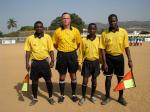

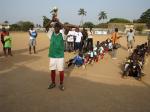




 *****
*****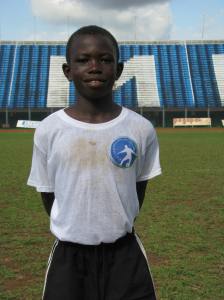
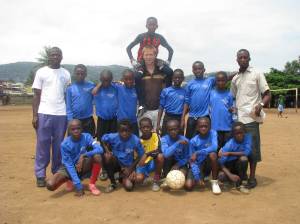
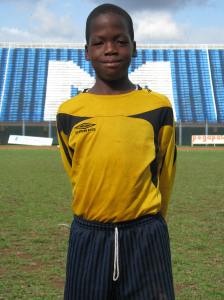 John Fillie has been shortlisted for the Craig Bellamy Academy first year admissions. If he makes it into the list of final 16 boys at Tombo, it would be another happy moment for John and his family. Barely 72 hours hours old in 1997, it was destined that John and his mother should survive the rebel war. His mother was put at gun point as a gun wielding combattant threatened to take baby John away. But another combattant felt it was not worth it. A baby next door though was unlucky. John is now looking forward to becoming a professional footballer and a lawyer thrrough the Bellamy academy.
John Fillie has been shortlisted for the Craig Bellamy Academy first year admissions. If he makes it into the list of final 16 boys at Tombo, it would be another happy moment for John and his family. Barely 72 hours hours old in 1997, it was destined that John and his mother should survive the rebel war. His mother was put at gun point as a gun wielding combattant threatened to take baby John away. But another combattant felt it was not worth it. A baby next door though was unlucky. John is now looking forward to becoming a professional footballer and a lawyer thrrough the Bellamy academy.